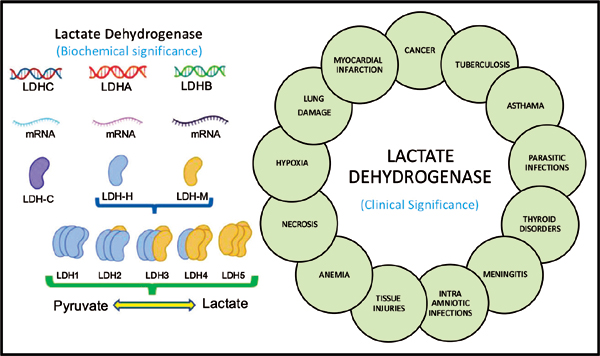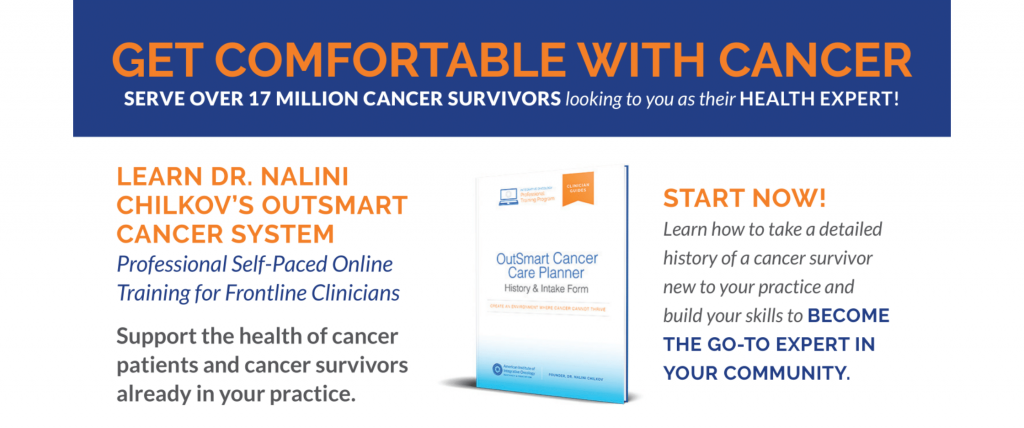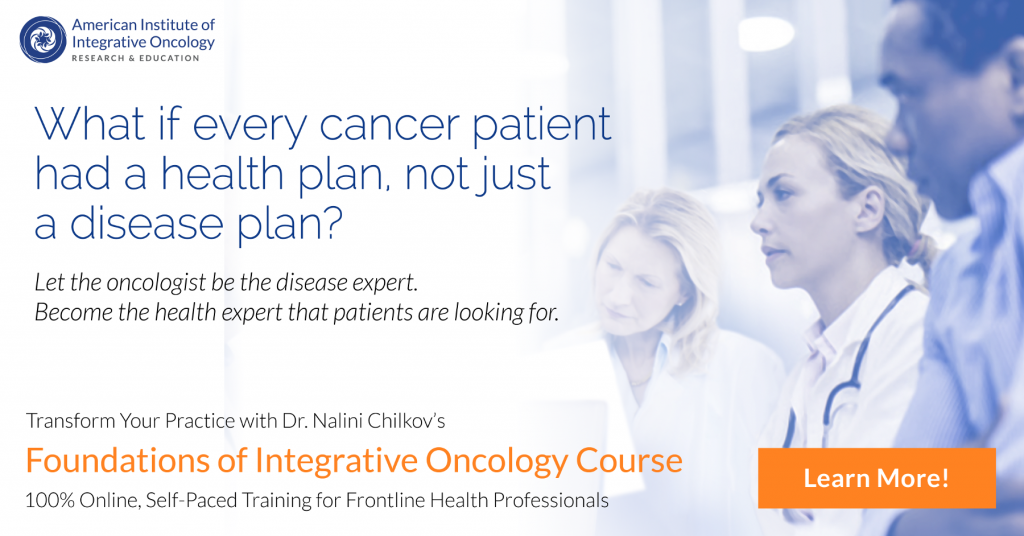Aberrant metabolism and inefficient fuel production are characteristic of tumor cells, which are dominated by aerobic glycolysis, increased lactate production, and a higher uptake of glucose (the Warburg effect). Elevated LDH is a marker of these aberrant metabolic processes in cancer cells. High serum LDH levels are associated with poor prognosis in patients with cancer and predict progression and overall survival.
Aerobic glycolysis was described for the first time about a century ago by Otto H. Warburg who showed that cancer cells metabolize glucose differently than normal cells (Warburg effect) and that tumors derive energy mainly from the conversion of glucose to lactic acid and minimally via cellular respiration involving oxygen. Tumors produce massive amounts of the aerobic glycolysis waste product, lactic acid. This is evidence of deregulated metabolism, hence the understanding of cancer as a “disorder of cellular metabolism”. Lactic Acid itself may promote the growth and spread of cancer cells, especially at high concentrations by changing the tumor microenvironment.
Lactate dehydrogenase (LDH) is an enzyme that catalyzes the reduction of pyruvate to lactate at the end of the glycolytic pathway.
The normal range for LDH is 100-333 u/L, with levels greater than 245 u/L considered to be in the upper quartile of normal. Elevated LDH, above 245 u/L, is suggestive of early carcinogenesis, tumor cell proliferation, tumor progression, and poor prognosis.
LDH is often highly elevated in aggressive forms of cancer and hematological malignancies including melanoma, lymphoma, acute leukemia, seminoma germ cell, pancreatic, gastric, lung, renal cell, nasopharyngeal, esophageal, cervical, and prostate cancers.
The OutSmart Cancer System® recognizes cancer as a metabolic syndrome and leverages the abnormal metabolism of tumor cells to exert influence over the tumor microenvironment and the behavior of tumor cells. Attending to the Cancer Terrain is a fundamental approach for influencing cancer cell metabolism.
EGCG, a catechin found in Green Tea (H. Camellia sinensis) has been identified as an agent which inhibits LDH activity in normal and low oxygen environments by influencing the conversion of pyruvate to lactate at the end of the glycolytic pathway. This may deprive cancer cells of their preferred fuel, glucose, and metabolites, including lactate that produces a favorable environment for malignant proliferation, growth, and progression. Recommended Therapeutic Dose 1-3 grams daily.
Monitoring trends in LDH is a method of both identifying abnormal cellular metabolism found in many solid and hematologic malignancies and is also of value in identifying early signs of recurrence as well as disease progression.
For patients achieving remission, during the first two years after completion of cancer treatment, LDH and other biomarkers of the Cancer Terrain are monitored every 3 months. Thereafter, every six months for 3-10 more years to track and identify early signs of recurrence.
For patients living with cancer as a chronic illness, LDH and biomarkers of the Cancer Terrain are monitored every 3 months to track evidence of recurrence and treatment resistance.
Learn more about monitoring the Cancer Terrain and the Tumor Microenvironment.
Receive training in Dr. Nalini’s OUTSMART CANCER SYSTEM ®. www.aiiore.com
By using biomarkers of the Cancer Terrain and cellular metabolism, it is possible to identify trends that allow for early intervention. LDH is one of the most valuable and reliable biomarkers reflecting the active presence of the aberrant physiology of tumor cells and is prognostic and predictive of progression and overall survival in cancer patients.
Selected References:
- Warburg, O. On the Origin of Cancer Cells. Science 3191, 309-314 (1956) DOI: 10.1126/science.123.3191.309
- Wulaningsih W, Holmberg L, Garmo H, et al
Serum lactate dehydrogenase and survival following a cancer diagnosis. Br J Cancer. 2015 Nov 3;113(9):1389-96. doi: 10.1038/bjc.2015.361. Epub 2015 Oct 15. PMID: 26469834; PMCID: PMC4815785. - Gallo M, Sapio L, Spina A, Naviglio D, Calogero A, Naviglio S. Lactic dehydrogenase and cancer: an overview. Front Biosci (Landmark Ed). 2015 Jun 1;20:1234-49. doi: 10.2741/4368. PMID: 25961554.
- Petrelli F, Cabiddu M, Coinu A, et al
Prognostic role of lactate dehydrogenase in solid tumors: a systematic review and meta-analysis of 76 studies. Acta Oncol. 2015 Jul;54(7):961-70. doi: 10.3109/0284186X.2015.1043026. Epub 2015 May 18. PMID: 25984930 Review. - Erez A, Shental O, Tchebiner JZ, et al
Diagnostic and prognostic value of very high serum lactate dehydrogenase in admitted medical patients. Isr Med Assoc J. 2014 Jul;16(7):439-43. PMID: 25167691 - Armstrong AJ, George DJ, Halabi S.
Serum lactate dehydrogenase predicts for overall survival benefit in patients with metastatic renal cell carcinoma treated with inhibition of the mammalian target of rapamycin. J Clin Oncol. 2012 Sep 20;30(27):3402-7. doi: 10.1200/JCO.2011.40.9631. Epub 2012 Aug 13. PMID: 22891270 - Uehara T, Doi H, Ishikawa K, Inada M, et al Serum lactate dehydrogenase is a predictive biomarker in patients with oropharyngeal cancer undergoing radiotherapy: Retrospective study on predictive factors. Head Neck. 2021 Oct;43(10):3132-3141. doi: 10.1002/hed.26814. Epub 2021 Jul 15.
PMID: 34268826 - Wu J, You K, Chen C, Zhong H, et al
High Pretreatment LDH Predicts Poor Prognosis in Hypopharyngeal Cancer. Front Oncol. 2021 Mar 11;11:641682. doi: 10.3389/fonc.2021.641682. eCollection 2021.
PMID: 33777804






